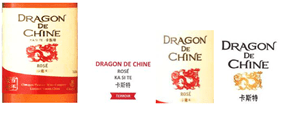- Home
- News & insights
- Insights
- Use of a figurative…
20 December 2022
Brands Update - December 2022 – 2 of 6 Insights
Use of a figurative mark as a decorative element does not constitute genuine use
What happened?
- The French beverage company Castel Freres is the owner of an EU trade mark for the following figurative sign:

covering various goods and in particular "still wines" in class 33. - The Chinese company Shangai Panati brought a revocation action before the EUIPO for lack of genuine use within a continuous period of five years.
- The Cancellation Division rejected the application for revocation but the Board of Appeal upheld Shangai Panati's appeal and revoked Castel Freres' registration. The Board of Appeal found, in essence, that the differences between the contested mark and the mark as used were such as to alter the distinctive character of the mark.
- Castel Freres filed an appeal with the General Court which confirmed the revocation of the contested mark in its judgment of 19 October 2022 (T-323/21).
In more detail:
The General Court first considered the definition of the "relevant public" and its perception of the contested mark.
Castel Frères argued that the relevant public was not the general public but consisted of Chinese consumers.
The General Court held that there was nothing in the wording of the application to suggest that the "still wines" were intended exclusively for customers of Chinese and Chinese-speaking origin. The mere fact that the Chinese characters forming the contested mark may be identified by the Chinese-speaking public is not in itself sufficient to establish and define a particular category of consumers targeted by the contested mark. In addition, Castel Freres acknowledged that its goods were also targeted at non Chinese-speaking consumers who frequented Chinese restaurants on a regular basis.
The General Court then looked at the nature of the use and the form in which the mark was used - see below:

In the combination, the Court held that the distinctive and dominant words elements "Dragon de Chine" and the representation of a dragon, altered the distinctive character of the contested mark.
Indeed, the relevant public - the general public - will not be able to verbalise or to memorise the Chinese characters covered by the contested mark, which will be perceived as meaningless, abstract signs or as decorative element referring to China or Asia.
In the combination, the contested mark as used, that is to say, in an ancillary position and in a much smaller size than the distinctive and dominant word elements "Dragon de Chine" and the representation of a dragon, would be perceived by the relevant public as a decorative element and not as an indication of origin of the goods.
What does the decision mean for you?
The General Court's decision reminds us that use of a figurative mark as a decorative element does not constitute genuine use. It also reminds us that use of figurative marks can be challenging as they are often used in combination with other signs or other registered marks – in the combination, the figurative mark needs to keep its essential function, being a badge of origin.
In this series
Use of a figurative mark as a decorative element does not constitute genuine use
20 December 2022
Watch out: Samsung liable for third party developers' infringing clock apps
20 December 2022
ECJ on the exhaustion of the right conferred by a trade mark in the case of reuse or refilling of goods - Soda-Club (CO2) and SodaStream
20 December 2022
Van Haren shoes not a slavish imitation of Dr Martens shoes
14 November 2022
by Multiple authors
The future of trade marks in the metaverse
Louise Popple, Timothy Pinto and Kachenka Pribanova look at upcoming trade mark issues in the metaverse.
5 December 2022
by Multiple authors
Related Insights

Important EU ruling for holiday, hotel and other service industries
by France Delord and Louise Popple

